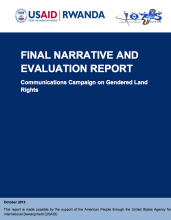Land Library
Bienvenue dans la bibliothèque du Land Portal. Explorez notre vaste collection de ressources en libre accès (plus de 74 000), comprenant des rapports, des articles scientifiques, des articles de recherche, des publications évaluées par des pairs, des documents juridiques, des vidéos et bien plus encore.
/ library resources
Showing items 1 through 9 of 191.This paper uses the case of South Africa’s latest land redistribution strategy known as the Proactive Land Acquisition Strategy, to explore whether, and how, research can have direct and positive impacts on beneficiaries of land reform.
Looking at several large-scale land deals in Mozambique, Tanzania and Zambia, this extraordinary documentary highlights the nuanced impacts of these investments.
The SPR 2015 provides a management record of sector progress over the financial years 2006/07-2014/15, identifying issues arising, as background for an analysis of main challenges for the sector.
The Ministerial Policy Statement is structured by Vote, as follows:
• Staff Establishment Structure Provides details of approved staff structure for each programme and project (including names of staff and vacant posts).
This is clearly demonstrated in the form of an organogram.
This report presents the results of a small scale household survey that was conducted in May
2015 to assess the extent to which rural Rwandan citizens are vulnerable or resilient to
environmental, market and land tenure risks and the level they understand the laws and rights
Residential land in Rwanda is scarce due to hilly terrain, a high population and a focus on agricultural growth to address food security concerns.
Between October 2014 and October 2015, Radio Ishingiro with the support of USAID
Land Project implemented a Communications Campaign focused on influencing the
attitudes and mindsets of men and boys about gender-equal land rights to overcome
This research, entitled "The Impact of Gendered Legal Rights to Land on the Prevalence and Nature of Intra- and Inter-Household Disputes" set out to interrogate the changing landscape of gendered land rights in Rwanda, and to examine the impact of the statutory changes introduced by laws governin
Rwanda has nearly 280,000 hectares of wetlands, almost 11% of the country’s total
area.1 These wetlands provide critical habitats for wildlife and biodiversity, maintain
important hydrologic processes that help to clean and protect ground and surface








